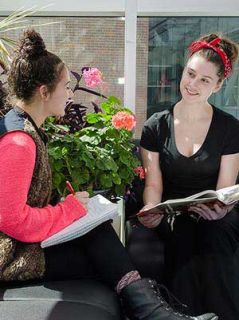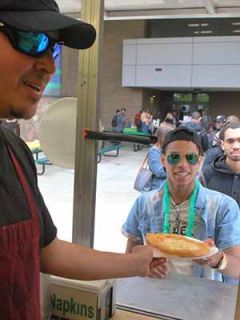News and Releases
The Spirit and Power of Poetry are Alive at NVCC
Share

Hello NVCC Family,
It occurred to me yesterday that this evening, Wednesday 4/8, we would have hosted our second spring Confluencia in Danbury. While life has certainly taken a major turn since we planned this semester's events, I thought the least we could do is to send a poem from each of the gifted folks we've missed hearing this semester.
Our March 11th program featured Hartford Poet Laureate and professor, Frederick-Douglass Knowles II; Middletown psychotherapist and poet, Karen Torop; and renowned Dominican poet and scholar, Sherezada Chiqui Vicioso. When COVID-19 struck, we'd booked one Danbury reader, award-winning Jamaican-American poet, Rayon Lennon. Below, I've included a poem from each of the featured readers, as well as one I wrote late last month.
Though we remain socially distanced for the good of all, I hope you'll find a bit of community in these poems, a reminder of our shared humanity--in good times and in bad. I wish you and yours good health and safety, and may you discover a bit of poetry in the small moments each day.
~ SP
From Frederick Douglas Knowles
SONOGRAM
Grandchild,
I see you coiled in your sanctum
cultivating through sonic resonance.
Your embryo shaped in the soul of Africa,
yet the size of a raspberry. Your heart
beats like Lumumba's in the seed
of the Congo. Your mind bathes in a river
of Malian wisdom settling under the suns
of Timbuktu. Your sacral rest on a
Pretorian throne. Cape Verde
your pineal crown. Ethiopia
your Eden. Love your Kingdom.
What do you dream?
Your mother is beautiful. Born from
this lineage we will leave to you.
Your father maturates into manhood
(you will help him with this).
I will spoil you like a Baba. Teach you
how to fasten your breastplate, affix
your shield, and wield your sword
with precision. How to breathe
with a sonic boom. Model for you
how a warrior protects the Eden
they have not even began to utter
into being. Your Chi will cause
mountains to melt into mustard seeds
placed into your back pocket
to be planted in the fertile soil
of your grandchild's mind,
as I will do for mine.
Black Rose City 2011
*********************************************************************
From Rayon Lennon
THE EXILE FLIES HOME TO TROUT HALL, JAMAICA
I fly down and get off a country
bus to stand on the bridge, under
which I was baptized at nine, trying
to interpret the sunny language of the river
of voices in the air above the
water-hugged rocks and heat-ripened
breasts of girls who look up, hurling
stony insults my way. So I cross,
follow a yellow butterfly into the sunny heart
of town, where the colorful
wooden shop fronts are littered with the idle voices
of half-naked men, leering at school girls in baby
blue uniforms, while their wives labor in the surrounding
ugli fields of Mr. Sharpe, the good Englishman,
who built and named this town of no trouts, Trout Hall,
who once a year deploys his planes
to spray his neighbors and green alligator-skinned
uglies, hybrid child of the orange, grapefruit
and tangerine. Everybody knows his slogan: “The Affliction
is only skin deep, the beauty is in the eating.” Over
the cardboard church even the pigeons sound gospel
and I am moved by brooks as brooding
as the bible; traffic flows the wrong way
and the English missionaries’ sun-blocking peach
Baptist church is still empty, except for the cows
chewing mouthfuls of shadowy grass and the cricketers crying, “Out”
as wheezing, rust-colored cars line up to cross the pocked face
of the palm-sheltered bridge. A divine
wind blows out the sun as I slip into a crowded
bar and down Red Stripes until I forget
who I am and announce to God that I am
trying to write a fiction greater than God,
a poetry to define our world.
Callaloo 362 (2013)
************************************************************
From Karen Torop
MY MOTHER’S OPAL DROP
It’s horizontal now, attached to a fine
silver chain. Taking out the opal
each time I visit, she says it will be mine
one day “because you like opals.” I doown opal earrings, a gift from my father,
still in their stiff paper box. Her
opal rests in her dresser, in one of the drawers
I used to straighten for Mother’s Day or her birthday,breathing the fragrance of her sachets, pressing the fleshy
sprayers of her perfumes, ordering the disarray of handkerchiefs,
nightgowns, whole and half slips, lacy bed jackets
we’d bought her for the breakfasts in bed we proudly, anxiouslybrought her. I folded feathery scarves, found
wrinkled photos of people I didn’t know,
and once a letter from my father saying he wanted
to have another child with her. I liked it vertical,dangling from a string of pearls. I don’t ask when
he gave it to her or why, this mouth ringed with diamond
teeth, this single eye, this bit of sky.
One day it will be mine, this hard stone.Fire in the Hand (2019)
***************************************************************
From Sherezada (Chiqui) Vicioso
HAITI
te imagino virgen
antes de que piratas precursores
te quitaran tus vestidos de caoba
y te dejaran asi
con tu senos redondos al aire
y tu falda de hierba desgarrada
apenas verde
marron timida.
Haiti
te imagino adolescente
olorosa a vetiver
tierna de rocio
sin esa multitud de cicatrices
con que te integraron al mercado de mapas
y con que te ofrecen multicolor
en las aceras de Puerto Principe
en Jacmel
en San Marcos
en el Artibonite
en un gran baratillo de hojalata.
Haiti
caminante que afanosa me sonries
interrumpiendo siestas de veredas
labrando piedras
asfaltando polvo
con tus pies sudorosos y descalzos.
Haiti qe tejes el arte de mil formas
y que pintas las estrellas con tus manos
por ti entendi que el amor y el odio
como tu
se llaman.
HAITI
I imagine you a virgin
before forerunning pirates
had removed your mahogany dress
to leave you thus
with your bare, round breasts
and your torn grass-skirt
barely green,
timidly brown.
Haiti,
I imagine you an adolescent
fragrant vetiver, tender with dew
without the numerous scars
displayed in the traffickers’ maps
and multicolor banners sold
on the sidewalks of Port-au-Prince,
Jacmel, St. Marc, and Artibonite
in a dramatic tin plate bargain.
Haiti,
traveler who eagerly smiles at me
interrupting the quiet of paths,
softening stones, paving dust
with your sweaty, bare feet
Haiti who can give art a thousand shapes
and who paints the stars with your hands
I found out that love and hate
share your name.
Translated by Daisy Cocco De Filippis, Ph.D.
*********************************************************
And for good measure, my latest:
Walking his cockapoo at the end of the world, the tall man thinks,
This is not a poem.
Trudging over misted park hills, the small brown dog remains disdainful of warnings.
His canine rejection of social distance seems admirable, but
it’s really just another symptom—like sloughing icebergs and protective orders—
of excess testosterone. It’s instinct, wound DNA-deep.
This is not a poem, he declares,
to the clotted sky. No one to overhear, the park
blank of raised eyebrows, of wonder wanderers, of inquirers,
of nickel-bag buyers. Is it imagination, or has the ground greened sincemorning?
If this were a poem he’d notice, would remark, perhaps would
dare to extol that puddle’s acid-rainbow gleam.
But, seriously? It’s only leftover rain and
brake fluid, not worth mentioning here. No
more than that burst of robins—
like suede gloves or black tulips
spilled from a wind-whirled sack—
signals spring. Down the track
a crooked man circuits the abandoned
courts, hisses thin air, does not
pause, even for nearing sirens. Even
for that city rooster’s call, which, if this
were a poem,
would seem to them all—even the dog—
to be an omen.
Other Naugatuck Valley Community College News
HAVE A QUESTION? EMAIL US.
Reporters and media inquiries, please contact us at










